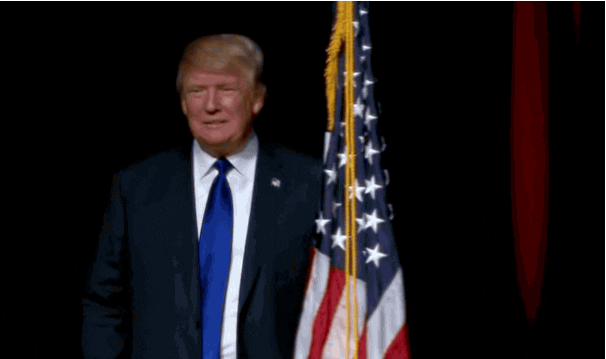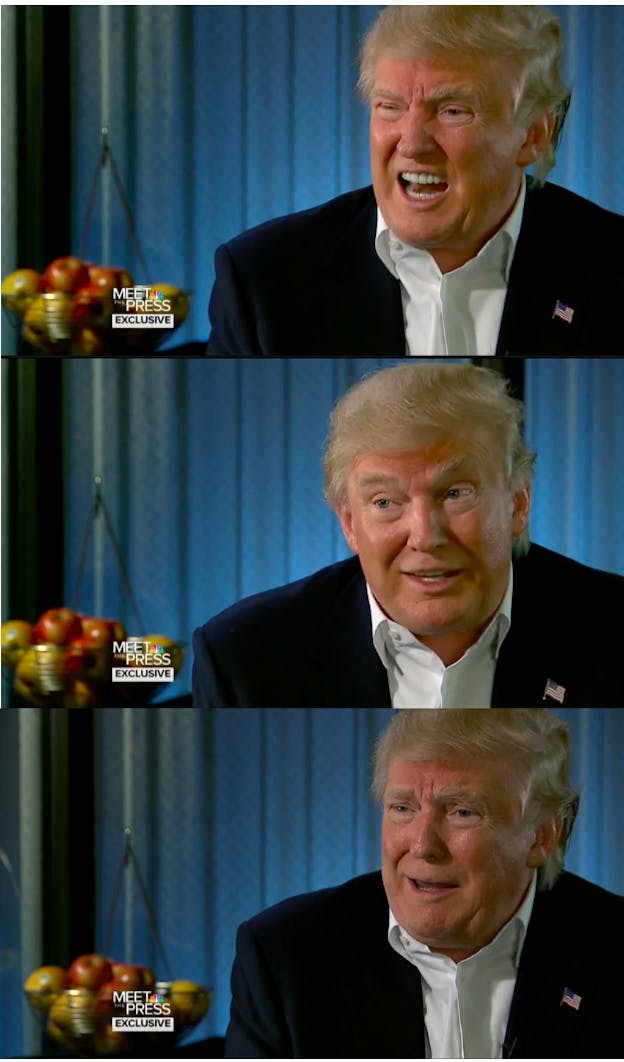
Donald Trump likes to say that he’s “very good looking,” but this is not quite true. He is no handsome square-jawed Marco Rubio, or Rick Perry, or Mitt Romney. His head is huge, his aging skin caked in bronze makeup, his eyes encircled by concealer that is too light. He’s got these distinct round cheeks that he’s passed down to all his kids. Sunlight often catches the powdery dust of his makeup sitting on his blond eyebrows.
But he is very good to look at. Because unlike most of the other candidates, Trump shows real emotion. He’s not afraid to make himself look really ugly. And this is one of the most important components of the aura of “authenticity” Trump projects. He somehow seems genuine even when he’s obviously bullshitting, like when a supporter held up a copy of The Art of the Deal at a Michigan rally and Trump said, “That's my second-favorite book of all time. Do you know what my first is? The Bible!" He points to the crowd, and then gives a thumbs up, smirks, and thumbs up again. "Nothing beats the Bible. Nothing beats the Bible. Not even The Art of the Deal.”
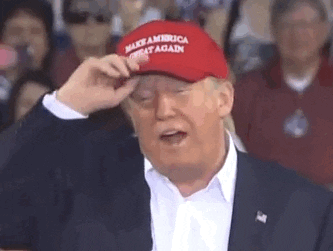
The key to Trump's authenticity is that he actually enjoys all of this, and it's obvious on his face. Take his performance before a massive crowd in an Alabama football stadium last month. In a bit he's repeated dozens of times, Trump says, "Who cares if it rains, right? You know if it rains I'll take off my hat and prove—" And he stops talking, and dramatically takes off his hat and runs his hand over his hair with great satisfaction, twice. "—I'll prove once and for all that it's mine." The crowd goes crazy. All his emotions are clear right there on his face—he seems to actually enjoy the physical sensation of running his hands through his hair on stage. He pauses to savor the moment. Letting himself feel and express real emotions is one of Trump's greatest gifts, because he seems like a real person, not a pre-taped personality. He shows joy and rage and contempt and even irony—irony while posing for photos with the American flag.
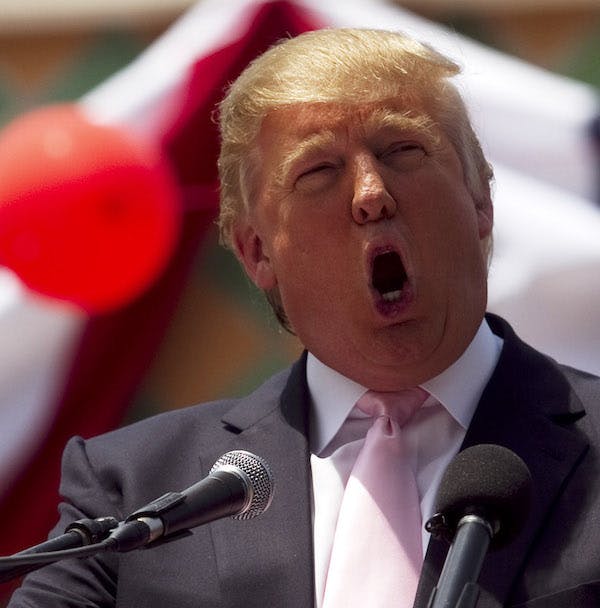
I’ve been a fan of Donald Trump’s face for four years. When he dropped his fake presidential campaign in 2011, it felt like a breakup. I was working for a news website, posting up to nine stories a day, and the funnest thing to write about was Trump's birther campaign. For months, I cropped high-quality photos of his face, scrutinizing different angles for the most ridiculous expression that would befit a story about, say, Trump's unbelievable bragging about his wealth, or his admission that he was just a teeny bit birther. The best is a classic Getty Images shot from a rally in Boca Raton, in which his face is frozen the most beautiful (hideous) square-ish O, a mixture of a child's tantrum and an opera singer. You rarely get to know a face so well unless it belongs to your significant other.

You can tell by browsing wire photo archives that the face Trump is making in the Getty photo is a fan favorite: There are countless images of him looking angry, with his lips smushed into an almost obscene oval. Some teens on Tumblr have used Photoshop to replace his lips with an anus. But like a true Trump face connoisseur, I prefer the B-sides. The rarest tracks. My favorite is his maniacal conspiratorial smile, which usually flashes by almost too quick to catch. I have to slow down my recordings and go frame by frame to capture it. But the effort is worth it. At right are four consecutive stills from a Fox News broadcast of Trump's confrontation with Univision's Jorge Ramos in August, in which the candidate kicked the journalist out of the press conference and then invited him back in. Once he's allowed to speak, Ramos tells Trump he's going to lose the Latino vote, that a huge majority have a negative opinion of him. As Trump listens, a smile quickly flashes over his face. He later gets Ramos to admit he has better polling in Nevada. (Fox News media critic Howard Kurtz excitedly blurted out the single most clarifying sentence about the episode: “It was almost like he was having him deported!”)
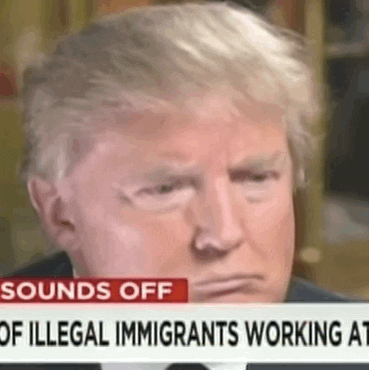
If you've watched any Trump interviews at all, then you've seen his fishlike listening face. If there is a weakness in his authenticity game, it is here. He nods solemnly, as if he is allowing reporters to believe he is taking their questions very seriously. He is attempting to look engaged, but unmoved. But he mostly looks like he's waiting for them to shut up so he can say what he wants. Here Trump strains to perform the role of serious candidate.
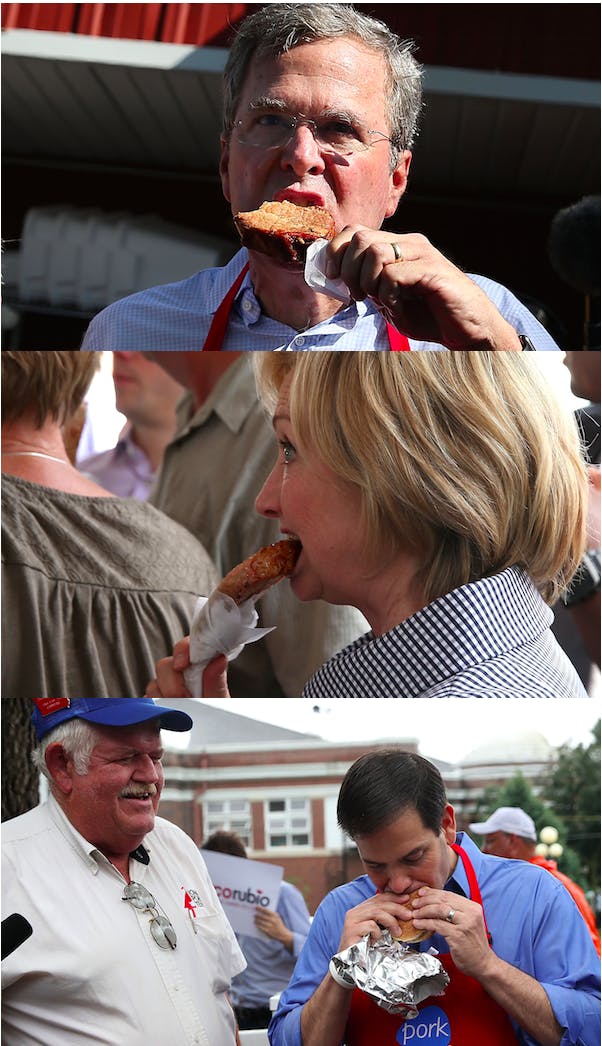
This is what makes Trump unique. The other candidates struggle to be real. Hillary Clinton's campaign is trying, for the millionth time, to find a away to make her appear more authentic by showing "more humor and heart," The New York Times reported last week. In the subsequent days, she apologized for her email scandal and then danced idiotically on The Ellen Show. She has tried to seem more human by doing the things that regular people do ("I'm just chillin in Cedar Rapids"), but fails because her enthusiasm is forced. Trump, by contrast, does things that regular people never do, like take kids on a ride in his helicopter near the Iowa State Fair, and he looks like he likes it. The entire point of the Iowa State Fair in a pre-presidential year seems to be to create opportunities for candidates to be photographed eating humiliating food and pretending to love it (see photo at right). Trump bit into a pork chop on a stick with relish.
Trump's face will be one of the most exciting parts of the GOP debate on Wednesday. Usually in these debates, politicians are smothering one emotion with the facial expression of a more pleasant one. The 2012 presidential debates, for instance, were packed with forced smiles. When Romney would attack Obama, Obama would flash an enormous grin, as if they were just good friends arguing over sports. Here is Obama super fake smiling when Romney says, "We have a president talking about someone's plan in a way that's completely foreign to what my real plan is."
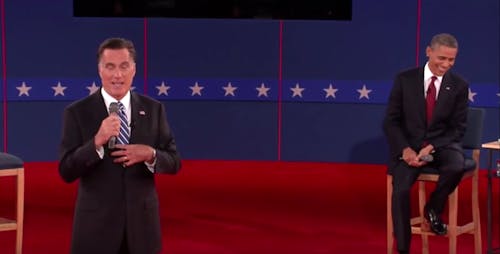
There was one big exciting moment in those debates—the kind of moment that Trump brings in any even slightly hostile situation—where we saw real aggression and no attempt to disguise it. It was when Romney claimed Obama did not immediately call Benghazi a terror attack, and Obama said he did too. Romney looked back at him like with a you-can't-be-serious nod. As Obama told the moderator to check the transcript because yes he did call it terrorism, his cool and detached demeanor melted away to true rage and loathing.
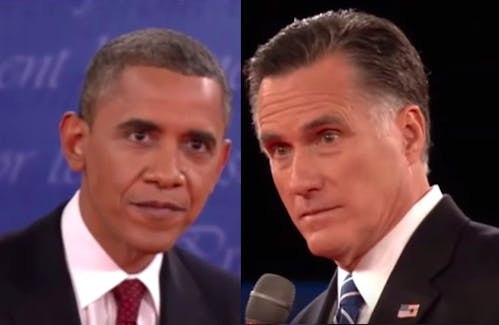
You don't have to wait an entire campaign for a single frame of video showing real anger on Trump's face. With Trump, there is no pretense of civility, whether with other candidates or journalists. There are many YouTube supercuts of Hillary Clinton fake-laughing away reporters' questions. If Trump doesn't like a question, his face will show contempt and disgust, and he might mock the reporter to her face. Which response you prefer depends on whether you value good manners over sincerity. But Trump doesn't appear to care about your preference.
Porn offers some insight into the magic of Trump’s face. In David Foster Wallace’s report on the Adult Video News Awards in Consider the Lobster, he argues that porn feels mechanical and lifeless because of the performers’ faces, which appear bored but actually show “the self locked away someplace far behind the eyes.” Wallace writes, “Surely this hiddenness is the way a human being who’s giving away the very most private parts of himself preserves some sense of dignity and autonomy—he denies us true expression.” But in the rare moments when "genuine erotic joy" washes over a performer's face, the "effect on the viewer is electric."
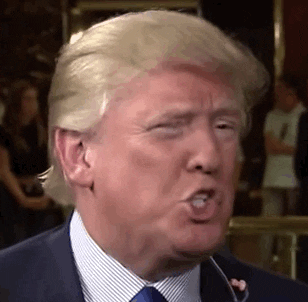
You can imagine the typical presidential candidate wants the same thing, a barrier between their true feelings and their Sunday show face. But Donald Trump doesn't seem to want a barrier. In an interview for Bloomberg's With All Due Respect, his expression shifts wildly as Mark Halperin and John Heilemann press him on a stupid but standard political question: What are his very favorite Bible verses? Trump refuses to answer, saying it's "personal." "There's not a verse that means a lot to you that you think about or cite?" Trump smiles sarcastically. Nope. The follow-up question is whether he's "an Old Testament guy or a New Testament guy." Somehow the interviewers have managed to make you root for Trump to duck the question.
And that's one more reason we love Trump's face. Even as he shows authentic emotion, he's mocking the silliness of the way we elected presidents, as if he's saying to the viewer, "Can you believe how stupid this shit is?" There is something that feels very real in the way he casually acknoweldges the artificiality of the situation—that we really would evaluate a presidential candidate by a single line in Ecclesiastes. As Trump said at the close of a recent press conference in South Carolina, "People are shocked at how smart I am."
